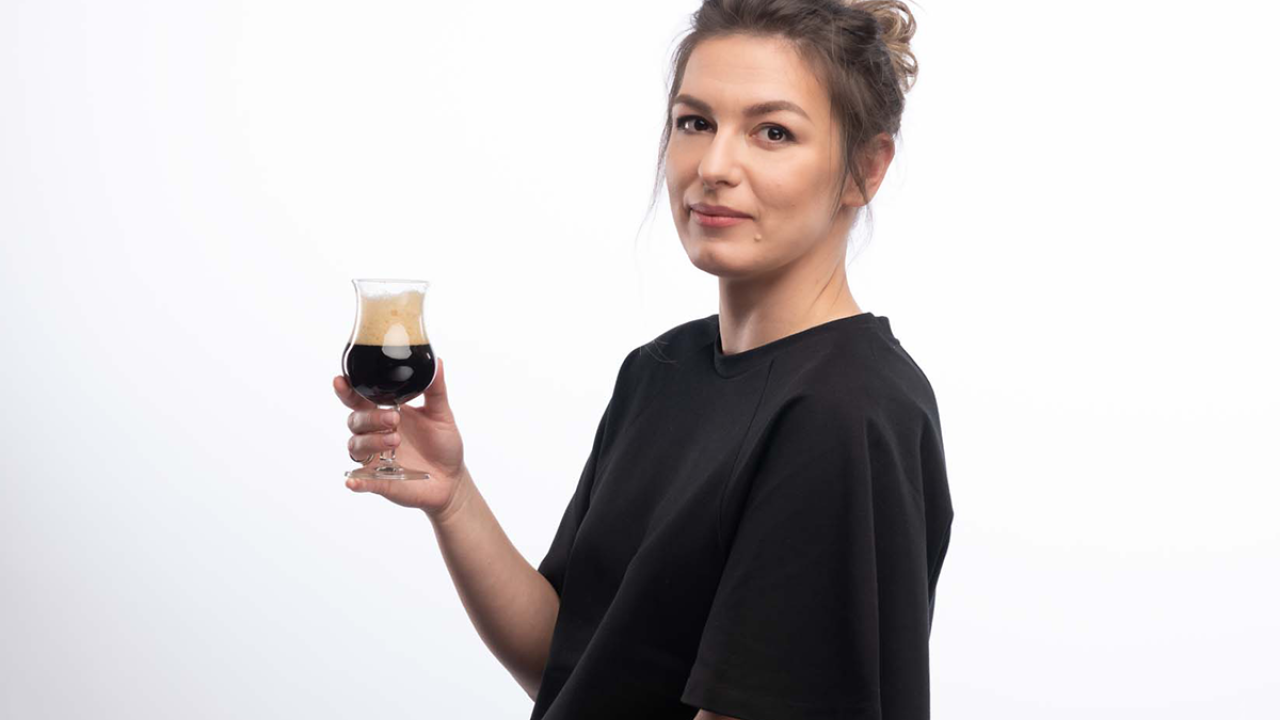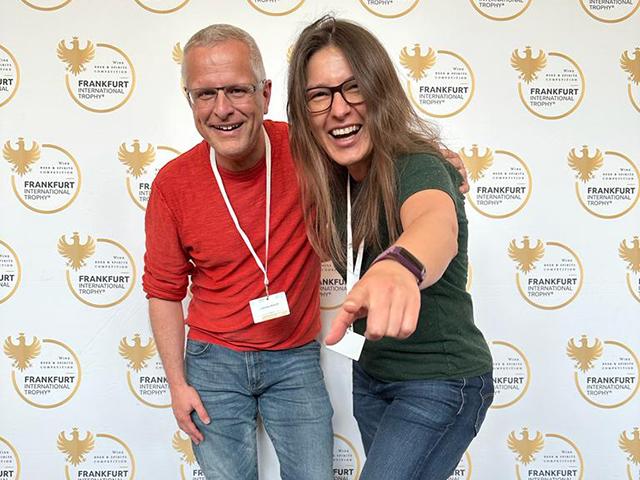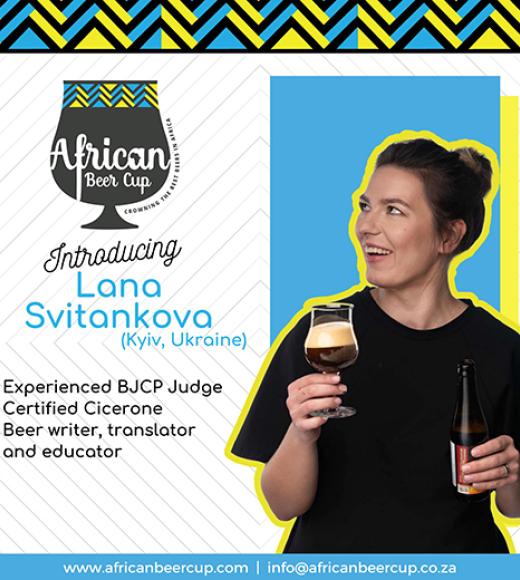
Pouring Passion: A Q&A with Esteemed Beer Judge Lana Svitankova
From beer enthusiast to beer judge, Lana Svitankova has come a long way since she first fell in love with the beverage while drinking a glass of dark Czech lager during her honeymoon in Prague in 2008. The Ukrainian native and 2022 UC Davis Tapping Potential Scholarship winner has been pushing the boundaries of emerging beer culture in her country through writing, translation, education and creating more space in the industry for female beer enthusiasts and professionals. Lana is the first Certified Cicerone in Ukraine and a regular judge in international beer competitions, including the 2024 World Beer Cup®.
Lana recently spoke to the 2024 UC Davis Master Brewers Certificate Program cohort about her experience in the industry, and we were lucky enough to get some one-on-one time with her to learn more about her love of beer, what it’s like being a beer judge and her advice for fellow beer enthusiasts.
I believe sincere and professional judging helps to better the overall quality of offerings on the market and stimulate hobbyists to keep going.
What have you been up to since being awarded the Tapping Potential Scholarship and completing the UC Davis Beer Quality series?
It was a tremendous boost in confidence. It was my first official beer education - besides all the self-education I did - and to study under Professor Bamforth is a treat in itself! I enjoy learning new things in general and the change of pace from self-study to doing a proper course was very much welcome. It didn’t really change what I do, which is mostly judging, translating and occasionally consulting breweries, but changed how I do it.
What were some of your biggest takeaways from the series and how have you been able to apply them?
All the new knowledge I’ve gained keeps surfacing in my memory when I need it, be it planning a new project or just hardcore geeking out with industry colleagues. My favorite and the largest “aha” moment was the freshness part of the course and the deep dive into how exactly oxygen spoils everything! I knew it was a major culprit, but oh the masks it can wear!

You were recently a judge at the 2024 World Beer Cup®. How did that come about? What was that experience like? What surprised you and what trends should people look out for?
I had the honor to join the WBC judges’ cohort for the second time, and it is a huge responsibility and pleasure. It’s the biggest and the most relevant beer competition in the world and the pinnacle of beer judge aspirations. Why do I say the most relevant? WBC is judged per Brewers Association Beer Style Guidelines, which are updated every year, not only after extensive expert consultation and research but also the analysis of market factors. So, it is kept real and up to date. To become a judge at WBC the applicant must provide a coherent CV and three references from people who judged at competition before, and these references should be precise and detailed, covering knowledge of beer styles, off-flavors, and personal traits of the potential judge.
When I got an invitation for the WBC 2023, I thought I would stress out about performing on the proper level because all the judges who get to participate are top-notch professionals. But after I met my first team and sat down, I felt almost serene (which is a surprise itself, considering the humongous amount of beer to be assessed). My ever-present impostor syndrome was hushed by the experience I’ve gained at previous competitions and my new educational endeavors. Judging with absolute legends, getting nuggets of their wisdom is a never-ending curve of learning. You also meet people from various countries and learn from them. Every time I go to a competition, I try to absorb as much as I can, because each and every one of them sparks conversations worth paying attention to and remembering.
In terms of trends and what people should look out for, I’d dare to suggest venturing further afield of the favorite styles. There are so many exciting beers people overlook because of sticking to one or a few styles they prefer.
What do you enjoy most about judging?
I love two things the most: discussing styles of specific origin with judges from the countries of its origin and getting a sample that perfectly fits the category it is submitted to and has no flaws and writing something like “Brew more of this!” in a scoresheet. I can’t contain the smile even thinking about it.

In your opinion, how does beer judging give back to the brewing industry?
There are two types of beer competitions: homebrewing competitions and events for commercial breweries. During the former, judges must describe the beer in detail, determine how well it represents the style, correctly and professionally identify the faults if present, and provide advice on how to avoid the flaws or get beer closer to style in the future. By doing this, judges contribute to the development of the beer scene and overall knowledge about beer. Also, by praising great samples or providing kind-hearted but constructive critique we motivate homebrewers to strive for more.
With commercial competitions, it’s more like helping to highlight the craftsmanship and quality beers in their respective categories without troubleshooting them. But what is important is remembering the context. People often ask me: “If I buy an award-winning beer, will I like it?” My honest answer is: “I have no idea.” I can assure you that the beer with a medal will be a high-quality beer, representing a specific style well, but whether you like it will depend on your personal flavor preference.
All in all, I believe sincere and professional judging helps to better the overall quality of offerings on the market and stimulate hobbyists to keep going.
What have you learned about yourself, the industry and brewing in general through being a beer competition judge?

Judging taught me to be humble. Beer judging is not about your ego and your preferences. It’s about doing justice to a sample, even if you can hardly call the style your favorite. It’s about listening to your team, discussing—not stating, and standing your ground with reasons but without being simply stubborn. It’s about being a good person and finding words of support and encouragement for every sample. Everything comes not only to being a qualified professional but also to being an agreeable person.
How has your passion for beer grown or changed since you first fell in love with it?
It is a love story indeed (I fell into the rabbit hole called “beer” during my honeymoon in Prague), and it progresses as such. The more facets you discover about the object of your love—the beautiful, the ugly, the frustrating, the inspiring—you either fall out of infatuation or embrace it all. With me, it’s the latter. You can't separate beer judging from the industry, and in recent years the industry has seen its share of highs and lows. Ultimately, brewing is a human endeavor and while I'm in awe of many brewing companies and the good they put out into the world, I've also been dismayed by the actions of some breweries or individuals. I had a burnout at work, so I stepped back a bit, but I never left beer as an industry and kept being engaged as an educator, translator, writer and judge. Judging takes me places and I am thankful for that. Discovering beer scenes in other countries is still as exciting as my first “beercation.” Learning from other cultures is as enriching for us as human beings, as for beer aficionados. So yes, I still love beer very much and discover something new all the time.
What advice do you have for other beer enthusiasts who want to be involved in the industry but not necessarily as a brewer?
There are so many ways to be involved! Besides brewing, there are many jobs at breweries, in distribution, at specialty bars and shops. You can write about beer or judge beer. You can homebrew! But silly as it sounds, I think supporting the industry as a customer is the most important part because the whole industry exists for beer lovers. If nobody’s buying the beer, it doesn’t matter how good it is, how many medals it got, or how beautiful the values of the brewery are. It will just quietly perish. Consuming beer consciously and mindfully, along with discovering more about styles and history of beer is the most I can ask for. And if you have a spark of interest, just engage with beer and beer people, they will show you the way. The beer community is still amazing.
What’s next for you?
At the end of June, I am judging at the World Beer Awards in London (UK), in September at European Beer Star (Germany), and in October at the International Beer Cup (Japan). All of them are commercial competitions, but I believe I’ll join a few local homebrewing competitions until the end of the year.
I also plan to finish a few translation projects into Ukrainian and see them being released (3 short books in general). Overall, I plan to keep going forward and moving whatever rocks I can move.
